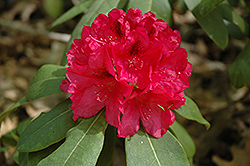Height: 8 feet
Spread: 7 feet
Sunlight:
![]()
![]()
Hardiness Zone: 6a
Other Names: Catawba Rhododendron
Description:
An attractive broadleaf evergreen shrub featuring cherry red flowers with a dark red spot in spring and an upright habit, good in partial shade; absolutely must have well-drained, highly acidic and organic soil, use plenty of peat moss when planting
Ornamental Features
The General Rhododendron is blanketed in stunning clusters of crimson trumpet-shaped flowers with dark red spots at the ends of the branches in mid spring. It has green evergreen foliage. The large narrow leaves remain green throughout the winter.
Landscape Attributes
The General Rhododendron is a multi-stemmed evergreen shrub with an upright spreading habit of growth. Its relatively coarse texture can be used to stand it apart from other landscape plants with finer foliage.
This is a relatively low maintenance shrub, and should only be pruned after flowering to avoid removing any of the current season's flowers. It has no significant negative characteristics.
The General Rhododendron is recommended for the following landscape applications;
- Accent
- Mass Planting
- General Garden Use
Planting & Growing
The General Rhododendron will grow to be about 8 feet tall at maturity, with a spread of 7 feet. It tends to be a little leggy, with a typical clearance of 1 foot from the ground, and is suitable for planting under power lines. It grows at a slow rate, and under ideal conditions can be expected to live for 40 years or more.
This shrub does best in full sun to partial shade. You may want to keep it away from hot, dry locations that receive direct afternoon sun or which get reflected sunlight, such as against the south side of a white wall. It requires an evenly moist well-drained soil for optimal growth, but will die in standing water. It is very fussy about its soil conditions and must have rich, acidic soils to ensure success, and is subject to chlorosis (yellowing) of the foliage in alkaline soils. It is somewhat tolerant of urban pollution, and will benefit from being planted in a relatively sheltered location. Consider applying a thick mulch around the root zone in winter to protect it in exposed locations or colder microclimates. This is a selection of a native North American species.
Disclaimer - This resource is provided for informational purposes only and does NOT reflect current availability. Inventory varies seasonally, so we cannot guarantee that every plant will be in stock at all times - please contact your favourite GardenWorks location directly for current availability. It does not include our entire inventory of plants, so be sure to visit GardenWorks to see varieties that may not be represented on this list.

